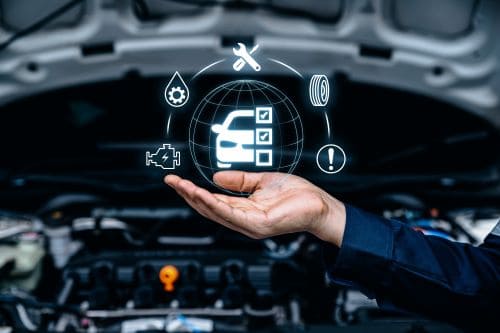Common Car Problems
Car problems can occur at any time, and it’s crucial for vehicle owners to know what to look out for to avoid being stranded or facing expensive repairs. From brake issues to engine troubles, understanding common car problems can help you maintain your vehicle’s structural integrity and avoid complex issues that could lead to major expenses.
- Transmission Issues
Transmission problems often manifest as slipping gears, delayed or rough shifting, grinding noises, or leaking transmission fluid. These are signs of underlying issues that can escalate if ignored. Addressing these mechanical issues early can save significant costs. Regular transmission fluid checks and changes are a crucial part of regular maintenance to prevent transmission failures.
- Brake Problems
Brakes are one of the most crucial safety components of a car. Squealing, grinding, or vibrations when braking are warning signs of potential issues. Failing to replace worn brake pads can lead to rotor damage and physical damage to the braking system. Regular brake inspections help ensure your vehicle stops safely and maintains its structural integrity.
- Signs of Head Gasket Leaks
A blown head gasket is a serious problem that can affect the entire vehicle. Common signs include white smoke from the exhaust, unexplained coolant loss, milky oil, and an overheating engine. Addressing these complex issues early can prevent significant damage to the engine. Look for signs of damage before it results in costly repairs.
- Engine Complications by Brand
Different car brands are known for specific mechanical issues. For instance, some German cars may have problems with timing chains, while certain American vehicles may experience valve or gasket complications. Understanding your vehicle’s common problems based on the brand can help prepare you for preventative maintenance and avoid surprise repairs. Knowing your brand’s typical diagnostic codes can also help in identifying problems quickly.
- Collision Damage Repairs
Whether it’s a minor fender bender or a major accident, collision damage needs immediate attention. Structural integrity can be compromised even by minor dents, leading to rust and further degradation over time. Whether it’s a dealership for repairs or an independent shop, getting collision damage assessed is crucial to avoid long-term issues.
- Electrical System Failures
Modern cars rely heavily on complex electrical systems. Common electrical issues include faulty alternators, dead batteries, malfunctioning headlights, and failing sensors. Keeping an eye on dashboard diagnostic codes and electrical warning lights is essential to avoid being caught off-guard. Routine checks can help you maintain the reliability of your vehicle.
Vehicle Maintenance Tips
Proper vehicle maintenance is the key to keeping your car running smoothly. Regular maintenance tasks like oil changes, tire rotations, and fluid checks can prevent many underlying issues from becoming major problems. Routine maintenance helps preserve the car’s value and functionality.
- Routine Maintenance Schedule – Creating a routine maintenance schedule ensures that the entire vehicle is checked regularly. Include oil changes every 5,000 to 7,500 miles, tire rotations every 6,000 to 8,000 miles, brake inspections every 10,000 miles, and a full vehicle inspection annually. This practice helps in spotting any complex issues early.
- Importance of Oil Changes – Regular oil changes are essential for the health of your engine. Oil lubricates moving parts, reduces friction, and maintains the engine’s structural integrity. Over time, oil breaks down and loses its effectiveness, leading to increased wear and tear. Stick to a consistent oil change schedule to extend your engine’s lifespan and prevent underlying issues.
- Tire Care and Rotation – Proper tire care includes maintaining correct air pressure, inspecting for wear, and regular tire rotations. These steps ensure even wear and extend tire life. Check tire tread depth regularly, especially if you’re dealing with slippery or icy conditions, to maintain safety and avoid mechanical issues related to alignment.
- Inspection of Belts and Hoses – Belts and hoses are critical to your car’s cooling, charging, and power steering systems. Cracks, leaks, or frayed belts can cause overheating and physical damage to vital components. Inspect belts and hoses for signs of damage during routine maintenance to avoid breakdowns.
Electric Vehicles: Common Concerns
As electric vehicles (EVs) become more popular, they bring a unique set of challenges. While they require less frequent maintenance, keeping up with electrical issues and battery care is essential to maximize performance.
Battery Maintenance
The battery is at the core of an electric vehicle, so proper maintenance is crucial. Regularly inspect battery terminals for corrosion and check for secure connections. In colder climates, using a battery warmer can help maintain efficiency. For EVs, avoid full charges and deep discharges, keeping the battery between 20% and 80% for longevity.
Charging Infrastructure Challenges
Access to reliable charging stations remains one of the top concerns for EV owners. Understanding the types of chargers—Level 1, 2, and 3—and their impact on charging speed is key. Installing a home charger can alleviate some of these concerns, and planning trips around available public charging infrastructure can reduce range anxiety.
Performance Issues
Electric vehicles have fewer mechanical issues than traditional cars, but performance problems still occur. Common signs include decreased range, sluggish acceleration, and poor battery performance in extreme weather. Regular software updates and consistent maintenance help in avoiding complex issues that could impact your vehicle’s efficiency.
Common Questions Answered
1. How Often Should I Change My Oil?
For most vehicles, oil changes should be done every 5,000 to 7,500 miles. Regular maintenance is crucial to avoid complex issues.
2. What are the Signs of Transmission Trouble?
Look out for signs like slipping gears, delayed shifting, strange noises, or transmission fluid leaks—indicators of underlying issues.
3. How Can I Tell If My Brakes Need Attention?
Squealing, grinding, or longer stopping distances suggest that brake pads need replacing to avoid physical damage.
4. What Causes Head Gasket Leaks?
Overheating is the primary cause of head gasket leaks. Watch for signs of damage like white exhaust smoke or milky oil.
5. How Often Should I Rotate My Tires?
Tire rotation is generally recommended every 6,000 to 8,000 miles to maintain even wear and protect the vehicle’s structural integrity.
6. What Should I Do If My Check Engine Light Comes On?
A check engine light can indicate anything from minor to complex issues. Use diagnostic tools or consult a mechanic at Pete Nelson Automotive for accurate information.
7. Are Electric Vehicles More Expensive to Maintain?
EVs generally have lower maintenance costs, but electrical issues like battery upkeep and charging infrastructure challenges can add complexity.
8. What Are the Benefits of Regular Car Inspections?
Regular inspections catch minor problems before they evolve into major, costly repairs, ensuring the vehicle’s safety and longevity.
9. How Can I Find a Mechanic I Can Trust?
Look for a certified technician with good reviews. Pete Nelson Automotive in Sun City, Arizona is a trusted choice for diagnostics, repairs, and routine maintenance. Contact them at 623-974-4723.
10. What Should I Do to Keep My Vehicle Running Smoothly Year-Round?
Follow a routine maintenance schedule, monitor fluids, check tire pressure, and address any warning lights. These steps help maintain the entire vehicle’s health.
Preventative Measures for Vehicle Longevity
Taking proactive steps to maintain your car can save you time, money, and headaches down the road. Here’s how to keep your vehicle in top condition for the long haul.
Regular Check-Ups
Scheduling regular check-ups for your vehicle is one of the most effective ways to extend its lifespan. Routine inspections allow a mechanic to identify common issues before they escalate into costly repairs. This includes checking fluid levels, inspecting brakes, testing battery health, and evaluating the condition of the tires. Addressing potential problems early, such as faulty spark plugs or issues with the air conditioning, can prevent serious engine damage. Pete Nelson Automotive can perform these routine check-ups to keep your car running smoothly. Contact them at 623-974-4723 to set up a fair deal on maintenance services.
Warning Signs of Potential Issues
Recognizing the early warning signs of potential problems can prevent serious damage to your vehicle. Look out for unusual noises, vibrations, dashboard warning lights, or a noticeable drop in performance. Strange smells, leaks, or difficulty starting your car are also red flags that shouldn’t be ignored. If you notice any of these symptoms, Pete Nelson Automotive can help diagnose and fix the issue promptly
Best Practices for Driving
Your driving habits have a significant impact on your vehicle’s longevity. Avoid aggressive driving behaviors like rapid acceleration, hard braking, and sharp turns, as they can put unnecessary strain on your car. Stick to a consistent speed, minimize idling, and avoid overloading your vehicle to maintain optimal performance. Gentle and mindful driving goes a long way in preserving the health of your engine, transmission, and suspension.
Finding a Trusted Mechanic
A reliable mechanic is invaluable for keeping your vehicle in great shape. Look for a shop that offers transparent pricing, has certified technicians, and provides excellent customer service. For those in need of a trusted and experienced mechanic, Pete Nelson Automotive is a dependable choice. They specialize in expert diagnostics, repairs, and preventative maintenance to ensure your car stays on the road longer. Reach out to them at 623-974-4723 for top-quality service you can count on.



